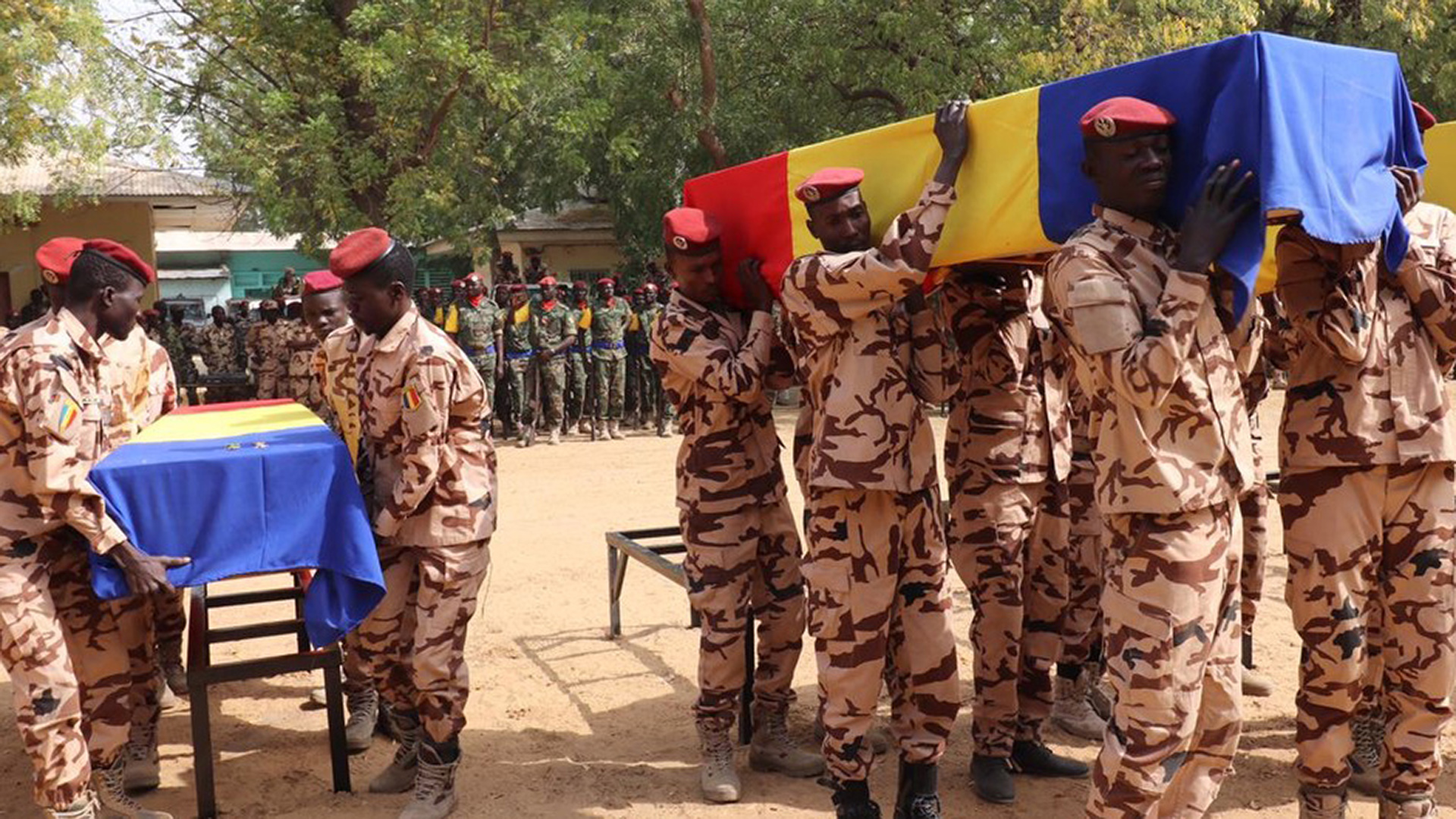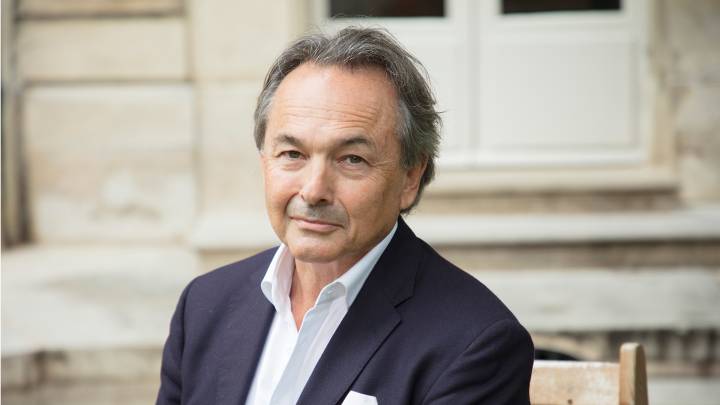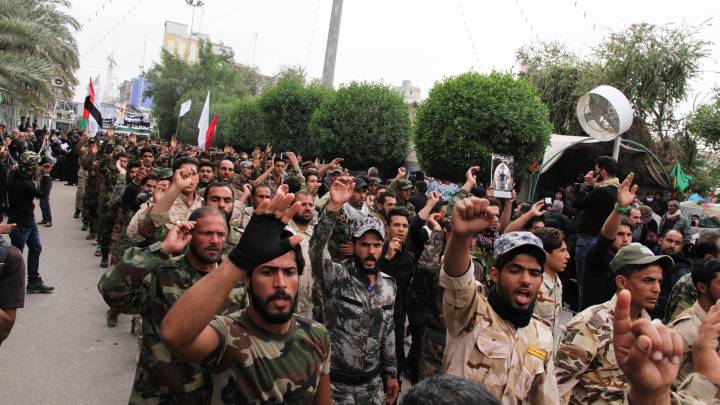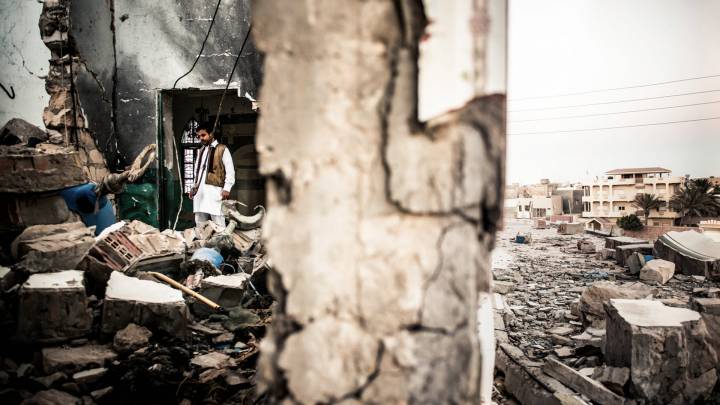Terror, organised crime, civil war over the border. A perfect storm is brewing over Chad and its much-praised army. The country’s president Idriss Déby now has to fight on several fronts – and seems poorly prepared.
In November 2017 the then prime minister of Chad, Albert Pahimi Padacké, proclaimed at the Dakar International Forum on Peace and Security in Africa: “There is not a single terrorist in Chad.” Although the veracity of this statement was refuted even then, it embodied the Chadian government’s long-standing attitude towards terrorism in both the Lake Chad and Sahel regions. Terrorism affects only our neighbours, not us.
After Boko Haram’s brutal attack on 23 March on a Chadian army camp in Bohoma in the Lake Chad province, however, nobody can avoid the reality any longer. Over a hundred soldiers were killed, several were kidnapped, the camp was looted, and large amounts of equipment destroyed or stolen. It was the worst terrorist attack in the country’s history. A clear sign of Boko Haram’s growing strength and the humiliation for “Africa’s best army.” Chad’s government described it as an “unexpected situation.” The attack represented the culmination of several years’ worth of developments in the Lake Chad region, which came to the fore in 2019 as the result of ongoing conflicts in Chad, Nigeria, Niger and Cameroon. The military problem that Chad faces can be summarised in three aspects.
Firstly, the country is involved in the various international missions in West Africa, including those led by the UN, such as MINUSMA (Mali) and MINUSCA (Central African Republic) or by regional organisations, such as G5-Sahel, ECOWAS or the Multinational Joint Task Force (MJTF) of the Lake Chad Basin Commission (LCBC). The Chadian army is also active in Libya and Sudan, where it is deployed for border protection. Even though these commitments can to some extent be lucrative for a country like Chad, its military capacities are overstretched. This is the case especially when domestic threats are taken into consideration, such as the rebel threat in the north-western region of Tibesti.
These growing internal security challenges are the second problem. Even though it has been ongoing for several years, the fight against rebels in the north and the east of the country consumes a lot of resources, the intensity of which is closely linked to the security situation in southern Libya. A current example of this is the “conquest” of the Tibesti region by fighters from the Military Command Council for the Salvation of the Republic (CCMSR) in February 2020, which resulted in fierce fighting between militant groups and the Chadian army. Together with a number of “security missions” in southern Libya requiring the support of the Chadian air force, the northeast of the country also requires the army. Many rebel groups are active in the northeast and east, some of them under the banner of the Union of Resistance Forces (URF). Additionally, there are an increasing number of communal conflicts which puts the capacities of the armed forces under further pressure.
The third aspect is the fight against terrorism in the Lake Chad region, where the army is participating in multilateral and bilateral operations. Since 2014 the Chadian army has supported the MJTF in the fight against Boko Haram. The MJTF carried out operations in Nigeria, Niger and Cameroon until December 2019. But since 2017, the government has been gradually recalling its troops to Chad, with soldiers leaving Niger first and then Nigeria in December 2019.
The attacks involve several waves of offensives, the diverse use of missile and air defence systems, and the severing of enemy supply chains through strategically positioned raids.
The official position is that the army must first and foremost ensure security within its own borders. A source within Chadian security has confirmed this. He said that concerns over domestic security and that cooperation with neighbouring countries was so consuming that the army had to be withdrawn. According to officials in the country’s capital, N’Djamena, it was more apparent that ever how much the situation in the Lake Chad region affected the entire country. Concerns over the vulnerability of the security situation in Lake Chad are justified. In 2017, when Prime Minister Padacké gave his aforementioned speech, seven attacks had been recorded in the province. By 2019, the number had risen to 35 – a fivefold increase compared to two years earlier.
This rapid development is no great surprise. The number of terrorist attacks perpetrated by either the Islamic State of West Africa Province (ISWAP), or Boko Haram under the leadership of Abubakar Shekau, has been rising since 2017, from over 400 to more than 500 in 2019. More important than the absolute numbers, however, are the trends on the ground. The country which has been the most cause for concern, Nigeria, the base of Boko Haram and ISWAP, has suffered fewer attacks since 2017, while its neighbours in the Lake Chad region, Niger, Chad and above all Cameroon recorded 300-500% more attacks.
Not only are the attacks becoming more frequent, the strategy is becoming ever more sophisticated. The attacks involve several waves of offensives, the diverse use of missile and air defence systems, and the severing of enemy supply chains through strategically positioned raids. Boko Haram has been applying these tactics in Bohoma and beyond, a pattern emulated by ISWAP.
These developments were also facilitated by the fact that these groups de facto dominate parts of the Lake Chad region. ISWAP has existed there as a proto-state state since 2017. The group has levied taxes on various goods and products, regulated the economy, built security infrastructure and implemented a school curriculum. Since June 2019, when ISWAP began a strategic partial withdrawal from the region, the authorities had done little to counter this balance of power.
For Chad, Boko Haram’s re-emergence has resulted in a war on two fronts in the southwest of the country.
But Boko Haram filled the void. Not least because the breakaway ISWAP commander Mallam Bakura joined them and provided the group with access to money, equipment and fighters. The advance towards Chad helped Boko Haram to stage a comeback after the organisation had steadily lost territory and influence over previous years. This resurgence is reflected in the number, planning and execution of the attacks as well as the increase in their media output. For Chad, Boko Haram’s re-emergence has resulted in a war on two fronts in the southwest of the country.
The situation will not improve in the medium term, simply because of the country’s geographical location. In the north of Chad, the severe fluctuations in the Libyan conflict are creating considerable security challenges, not least because of the threat posed by the Chadian rebel group CCMSR, whose aim is to overthrow the government of President Déby, who they consider a dictator. There is also General Khalifa Haftar’s offensive in southern Libya, organised crime activity and the small but not insignificant presence of the Islamic State to contend with.
The situation on Chad’s western border is no better. ISWAP and its partner, the Islamic State in the Greater Sahara (ISGS), are spreading deeper and deeper into neighbouring Niger. The jihadists’ influence now ranges from Tillaberi in the southwest to Diffa, a province which borders Chad. It was mainly from this area that ISWAP prepared and launched its attack into Chad.
Further along the southern border, the threat of terrorism is also growing in the very north of Cameroon. There, Boko Haram and its allies among the Bakura militia conduct an average of five attacks a week, albeit less intense than those in Niger, Nigeria and Chad. Nevertheless, the situation on Chad’s southern border remain precarious as its anti-terrorism policy has proven to be ineffective. Despite some successes, such as the killing of Mallam Bakura during an MJTF operation on 13 March 2020, neither Niger, Cameroon nor Nigeria have yet been able to prove that their respective strategies and tactics have been paying off.
Both the television pictures of Déby's visit to Bohoma after the attack and of him personally taking charge of operations against Boko Haram are intended to emphasise the Chadian head of state's personal commitment.
All these countries are facing similar problems to Chad. They are all fighting wars on several fronts with limited resources, while domestic problems pose increasingly more potent threats. It is unclear whether a renewed international counter-terrorism mission in the Sahel – for example the Task Force Takuba initiated by France on 28 March – can provide support under the current circumstances.
The Chadian army has repeatedly proven that is one of Africa’s very best. The success of Operation Serval, a 2013-14 French military deployment in Mali, was largely due to Chad’s contribution. The good reputation of its fighters, although tarnished by legitimate accusations of human rights violations, still earns the army a great deal of respect in African and European military circles.
President Idriss Déby is also worried about his personal reputation. He after all emerged from the ranks of the military and served as a pilot and an officer in the air force. He must regard the humiliating defeats as a personal affront. Both the television pictures of Déby's visit to Bohoma after the attack and of him personally taking charge of operations against Boko Haram are intended to emphasise the Chadian head of state's personal commitment to solving the issue.
This approach alone will be of little use as long as the neighbouring countries themselves serve as safe havens for terrorists, and transnational security in the Lake Chad region remains ineffective. Ultimately, terrorism has been deeply rooted in the region since 2009. Its growth has been reinforced by conflict dynamics in the Sahel, North Africa and the Central African Republic, as well as by economic and political problems and the growing power of organised crime on the ground.
A perfect storm is brewing over the Lake Chad region. Until the countries of the region drastically improve their security capabilities, develop effective joint strategies beyond solely military measures and learn to cooperate more efficiently, attacks like the one in Bohoma will become commonplace. Regardless of what Chad and Déby's will alone can achieve.
Yan St-Pierre is a terrorism expert specialising in Africa and the Middle East. He is currently CEO of the Berlin-based security consulting group MOSECON.




